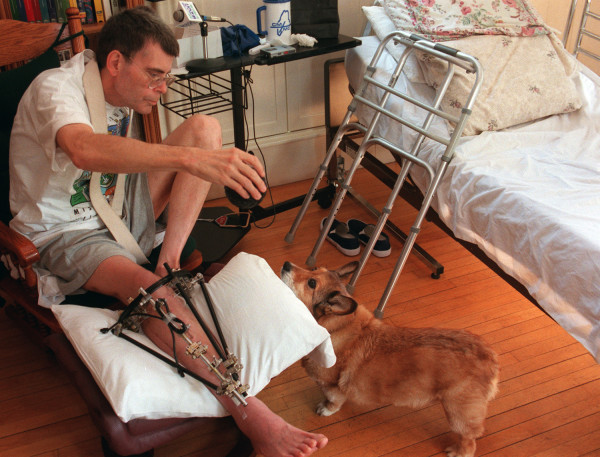Stephen King
was interviewed for Fresh Air by
Terry Gross in a piece called “The ‘Craft’ of Writing Horror Stories.” The
interview specifically focused on the book he wrote, On Writing, during his recovery process after being seriously injured.
The first
thing that horror writer Stephen King heard from the perpetrator of an awful
car accident was “I’ve never had so much as a parking ticket in my life and here
it is my bad luck to hit the best-selling writer in the world… I loved all your
movies.” King was hit by a car and broke almost every bone on the right side of
his body when hit by Brian Smith who King described as a back-country character
with a Rottweiler and an old van, ironically fitting the main character
qualities of a Stephen King book. He
pointed out how funny it is that he was nearly killed by a character from one
of his own writings, further explaining that he never feared that his writing
would jinx him but often wrote about fatal crashes and traffic accidents in
order to connect to many audience members who knew someone who was affected by
that.
The irony
continued because Brian Smith, the man who almost killed Stephen King, died
later from a drug and alcohol overdose, alcoholism being a very serious hindrance
in King’s life, leading to drunkenly written novels and later A.A. meetings.
"If
I thought anything was unfair about what had happened to me, it was that after
struggling and winning a battle to get off all sorts and drugs and alcohol
[before the accident] — [not only did I] have a problem with beer and cocaine;
I was an addictive personality, period. I was smoking two packs of cigarettes a
day. I loved Listerine. I loved NyQuil. You name it. Boy, if it would change
your consciousness, I was all for that. And I was able to jettison almost all
of those substances out of my life.”
King suppressed
any subconscious thoughts that could possibly resurface to a clear conscious
mind through alcohol and cocaine. Freud, a big creative, also advocated for
cocaine, and it makes sense when both creatives mention the subconscious. Lehrer
provides an explanation for Freud’s idea of suppression and repression. Freud mentions
repressing the unconscious mind, Lehrer explains "there is another region
of the brain that can be activated as we go about editing reality. It’s called
the dorsolateral prefrontal cortex or DLPFC. It’s located just behind the
forehead and is one of the last brain areas to develop in young adults. it
plays a crucial role in suppressing so called unwanted representations getting
rid of those thoughts that don't square with our preconceptions. for scientists
that is the end of the problem." King went through many methods to repress
his subconscious and maybe the unwanted horror thoughts he had, but would dig
deep when writing just as Freud did to develop new theories for psychoanalysis.
King kept
the same lenses that were in the broken frames of the glasses he wore during
the accident while he wrote On Writing. This
subtle reminder brought out some ideas and feelings that he could reference for
his writing. He used the experience of having a broken leg from the accident in
a book called “Dreamcatcher” where he writes about surrealistic hallucinations
in a man’s hospital experience. The hallucinations mimicked his own through the
lenses of medications and pain in his own hospital room.
King drew
on what he lived through in his hospital room when he was only partly
conscious, and he explained his subconscious muses as “the boys in the basement.”
He came down to the “blue collar guys” once in a while, where they just hung
around, he grabbed a few ideas, and then left them to “polish their bowling
trophies” in the basement (subconscious) once again.
Though
this accident shaped his writing in a new way and gave him a lot of free
recovery time to think, King says he would rather have the boring life than
being hit by a van, gaining new experiences, and getting more writing
inspiration. King planned to purchase and destroy the car that hit him, which articulated
how scarred he was by the accident. King’s mom told him to say out loud and
then write down anything that terrified him, so she significantly impacted his process
of writing even up until he got into a serious accident.
http://www.npr.org/templates/story/story.php?storyId=128239303
https://luc.app.box.com/s/n7kukzdq2un1v91v6gjq3pjphzyrvl94/file/47466982781


I really enjoyed the post! I thought the examination into the trauma and effect of his accident was very well handled and offered some good insight.
ReplyDeleteI also really enjoyed this post. I think it's very interesting how so many creatives struggle with addiction to drugs and alcohol. I wonder if this is something that ultimately ends up positively or negatively affecting their work in light of the obvious negative impact on their life in general.
ReplyDelete